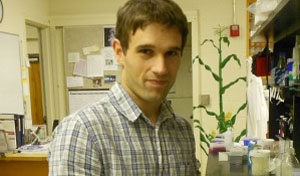The Environmental & Plant Biology Colloquium for Friday, Jan. 24, at 11:50 a.m. in Porter Hall 104 is presented by Dr. Jonathan I. Gent, Postdoctoral Researcher in the Department of Plant Biology at the University of Georgia. Dr. Morgan Vis is host.
Gent’s presentation is on “The other 90%: intergenic heterochromatin landscapes of the maize genome.”
ABSTRACT: RNA-directed DNA methylation in plants provides a well-characterized model for how non-coding transcription can function in heterochromatin establishment or maintenance, with implications for other eukaryotes. Maize has a long history as a model organism for discovery of heterochromatin-related phenomena such as transposons, paramutation, and genomic imprinting, and its heterochromatin has been proposed to underlie agriculturally important traits. Nonetheless, maize heterochromatin remains poorly characterized. We are carrying out deep sequencing-based analyses of RNA expression and chromatin features to survey heterochromatin landscapes of the maize genome. Surprisingly, we have found that RNA-directed DNA methylation is associated with only a subset of heterochromatic loci that are close to genes, and it is excluded from regions traditionally thought of as heterochromatic in the sense of dense, inaccessible chromatin. These results also have implications for how the maize accomplishes large-scale genetic repression as well as precise and localized repression, while allowing for expression of nearby cellular genes.
Read more about his work at http://www.plantbio.uga.edu/directory/jonathan-gent-0.



















Comments